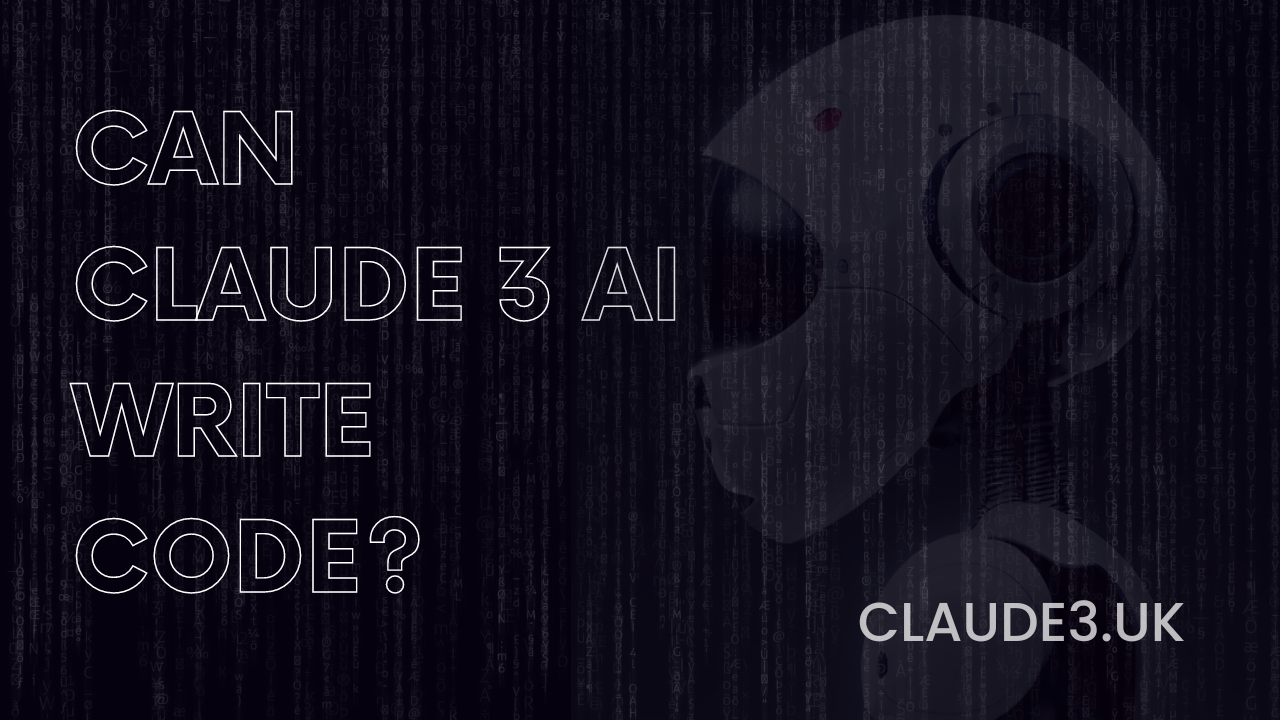Introduction
Artificial intelligence (AI) has evolved significantly, transforming various industries and making substantial impacts in fields like healthcare, finance, and technology. Among the latest advancements in AI is Claude 3, an AI model designed to perform various tasks including conversation, content creation, language translation, code generation, and visual processing. This article delves into one specific aspect: the capability of Claude 3 AI to write code.
Understanding Claude 3 AI
Claude 3 is part of a new wave of AI models designed to understand and generate human-like text based on the inputs it receives. It is built upon sophisticated machine learning techniques, utilizing vast amounts of data to learn language patterns, context, and structure. This enables it to perform a wide range of tasks with a high degree of accuracy and fluency.
The Evolution of AI in Code Generation
Early AI Code Generators
The journey of AI in code generation began with simpler models that could perform basic tasks such as syntax correction and code completion. These early models were limited in scope and often required significant human intervention to produce functional code.
Modern AI Code Generators
With advancements in deep learning and natural language processing, modern AI models like Claude 3 have achieved remarkable capabilities in code generation. They can understand complex programming languages, generate substantial blocks of code, and even debug existing code. This progress has opened up new possibilities for software development, making it faster and more efficient.
How Claude 3 AI Generates Code
Training and Data
Claude 3 is trained on a diverse dataset that includes code snippets, documentation, and examples from various programming languages. This extensive training enables it to understand the syntax and semantics of different languages, from Python and JavaScript to more specialized languages like R and Rust.
Language Models and Context
One of the key strengths of Claude lies in its ability to understand context. It doesn’t just generate code based on isolated inputs; it considers the broader context of the request. This means that it can maintain consistency and coherence across multiple lines of code, understand dependencies, and follow the logical flow required for complex programming tasks.
Practical Examples of Code Generation
Example 1: Simple Python Script
Suppose a user asks Claude to generate a Python script that calculates the factorial of a number. The request might be as simple as: “Write a Python function to calculate the factorial of a number.”
def factorial(n):
if n == 0:
return 1
else:
return n * factorial(n - 1)
# Example usage
number = 5
print(f"The factorial of {number} is {factorial(number)}")Claude 3 can produce this code accurately, ensuring it adheres to Python syntax and logical structure.
Example 2: Web Development with JavaScript
A more complex request might involve creating a web form using JavaScript. The user might request: “Generate a JavaScript function to validate a web form with fields for name, email, and phone number.”
function validateForm() {
var name = document.forms["myForm"]["name"].value;
var email = document.forms["myForm"]["email"].value;
var phone = document.forms["myForm"]["phone"].value;
if (name == "") {
alert("Name must be filled out");
return false;
}
if (email == "") {
alert("Email must be filled out");
return false;
}
if (phone == "") {
alert("Phone number must be filled out");
return false;
}
return true;
}Here, Claude 3 generates code that not only validates the form fields but also provides user-friendly alerts.
Debugging and Optimization
Claude 3 is not limited to generating new code; it can also assist in debugging and optimizing existing code. Users can input problematic code and request debugging help, and Claude can identify potential issues and suggest fixes.
Example: Debugging a Python Function
Consider a faulty Python function that calculates the square root of a number:
import math
def calculate_square_root(number):
try:
if number < 0:
raise ValueError("Cannot compute square root of a negative number")
result = math.sqrt(number)
return result
except ValueError as e:
return str(e)
# Faulty input
print(calculate_square_root(-4))If the user reports that the function does not handle negative inputs correctly, Claude 3 might suggest modifications to improve the error handling:
import math
def calculate_square_root(number):
try:
if number < 0:
raise ValueError("Cannot compute square root of a negative number")
result = math.sqrt(number)
return result
except ValueError as e:
return str(e)
# Correct usage
print(calculate_square_root(-4)) # Output: Cannot compute square root of a negative numberBenefits of Using Claude 3 for Code Generation
Increased Efficiency
By automating repetitive coding tasks, Claude 3 allows developers to focus on more complex and creative aspects of software development. This leads to faster development cycles and reduced time-to-market for new applications.
Improved Accuracy
Claude 3’s ability to understand and generate accurate code reduces the likelihood of errors and bugs. This results in higher quality software and fewer resources spent on debugging and testing.
Accessibility for Non-Programmers
Claude 3 can enable non-programmers to create functional code without extensive knowledge of programming languages. This democratizes software development and empowers a broader range of users to develop applications.
Versatility Across Languages and Frameworks
Claude supports multiple programming languages and frameworks, making it a versatile tool for developers working on diverse projects. Whether it’s web development, data analysis, or mobile app development, Claude 3 can assist in various domains.
Challenges and Limitations
Contextual Understanding
While Claude excels at understanding context, there are scenarios where its comprehension may fall short. Complex applications with intricate dependencies might require human intervention to ensure the generated code aligns with the overall project architecture.
Security Concerns
Automatically generated code must be scrutinized for security vulnerabilities. Developers need to review and test Claude 3’s output to ensure it adheres to security best practices, especially in applications handling sensitive data.
Ethical Considerations
The use of AI in code generation raises ethical questions about job displacement and the future role of human programmers. While AI can enhance productivity, it is essential to balance automation with opportunities for human skill development and creativity.
Best Practices for Using Claude 3 in Code Generation
Clear and Specific Instructions
To get the best results from Claude 3, users should provide clear and specific instructions. Detailed prompts help the AI understand the desired outcome and generate more accurate code.
Iterative Development
Using Claude 3 in an iterative development process can enhance its effectiveness. Developers can generate initial code, review and refine it, and then use Claude 3 to address specific areas or add new features.
Code Review and Testing
Despite Claude 3’s capabilities, human oversight is crucial. All generated code should undergo thorough review and testing to ensure functionality, security, and adherence to project requirements.
Continuous Learning and Adaptation
As AI models like Claude 3 continue to evolve, developers should stay updated with the latest advancements and integrate new features and improvements into their workflows. Continuous learning and adaptation will maximize the benefits of using AI in code generation.
Comparison with Competitors
OpenAI Codex
OpenAI Codex, another prominent AI code generator, shares many similarities with Claude 3. Both models are designed to understand natural language and generate code in various programming languages. However, there are differences in their training data, underlying architecture, and specific capabilities.
GitHub Copilot
GitHub Copilot, powered by OpenAI’s Codex, is a popular tool integrated into the GitHub ecosystem. It offers real-time code suggestions and completions, making it a valuable asset for developers working within GitHub repositories. Claude 3, while equally powerful, may offer a broader range of applications beyond just code completion.
Google AI
Google’s AI initiatives also include tools for code generation and assistance. These tools are often integrated with Google’s cloud services and developer platforms. Claude 3, with its versatile capabilities, can complement Google’s offerings by providing additional support in various programming tasks.

Future Prospects of AI in Code Generation
Enhanced Collaboration
AI models like Claude 3 are likely to become integral parts of collaborative development environments. Teams can leverage AI to streamline workflows, share knowledge, and reduce repetitive tasks, leading to more efficient and innovative projects.
Integration with Development Tools
As AI continues to advance, we can expect deeper integration with development tools and platforms. AI-driven code generation, debugging, and optimization features will become standard components of IDEs (Integrated Development Environments), making them more powerful and user-friendly.
Expanding Capabilities
Future iterations of AI models will likely expand their capabilities to include more advanced features such as automated refactoring, performance optimization, and even AI-assisted design of software architectures.
Ethical and Regulatory Considerations
The growing use of AI in software development will necessitate ethical and regulatory considerations. Ensuring transparency, accountability, and fairness in AI-generated code will be critical to maintaining trust and integrity in the development process.
Conclusion
Claude 3 AI represents a significant leap forward in the realm of code generation. Its ability to understand context, generate accurate code, and assist in debugging and optimization makes it a valuable tool for developers. While there are challenges and limitations, the benefits of using Claude 3 in software development are substantial.
By following best practices and staying attuned to future advancements, developers can harness the full potential of Claude 3 to create high-quality, efficient, and innovative software. As AI continues to evolve, it will undoubtedly play an increasingly important role in shaping the future of software development.
FAQs
Can Claude 3 write code?
Yes, Claude 3 can write code. It can generate code snippets, complete code blocks, and even assist in debugging and optimizing existing code across multiple programming languages.
Which programming languages does Claude 3 support?
Claude 3 supports a wide range of programming languages, including but not limited to Python, JavaScript, Java, C++, C#, Ruby, PHP, and more.
How does Claude 3 generate code?
Claude 3 generates code by understanding the context of the input provided by the user. It uses its training on diverse datasets, including code snippets and documentation, to produce accurate and coherent code based on the given instructions.
Can Claude 3 debug code?
Yes, Claude 3 can assist in debugging code. Users can input problematic code, and Claude 3 can identify potential issues and suggest fixes to resolve errors.
Are there any limitations to Claude 3’s code generation capabilities?
Yes, while Claude 3 is powerful, it may occasionally struggle with highly complex contexts or intricate dependencies. Additionally, ethical considerations, such as job displacement and the need for human oversight, must be taken into account.
How can I get the best results from Claude 3 when generating code?
To achieve the best results, provide clear and specific instructions, use an iterative development process, review and test the generated code thoroughly, and stay updated with the latest advancements in AI code generation.
How does Claude 3 compare to other AI code generators?
Claude 3 is comparable to other AI code generators like OpenAI Codex and GitHub Copilot, with unique strengths in understanding context and versatility across different tasks. Each tool has its specific capabilities and integrations, making them suitable for different use cases.
